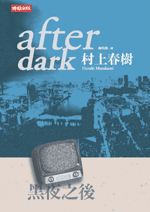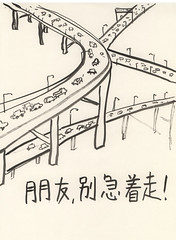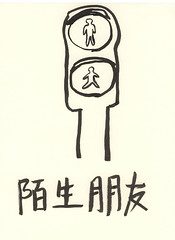 If there were any possible excesses in After Dark, they are reined in by the simple formal structure of the book. The novel unfolds from midnight till daybreak, following a set of characters through their sleep or sleeplessness. It is a most rhythmic book, the narrative mimics the slow descent of night with its darkening story, pace and tone; and into the lightheadedness of 4am, a time when secrets are often revealed. And the quick approach of a new day in the novel also offers a quick glimpse into a new start for 2 of the key characters - a reconciliatory, restorative sleep for the insomniac, and the promise of wakefulness for the one in the deepest of emotional slumber.
If there were any possible excesses in After Dark, they are reined in by the simple formal structure of the book. The novel unfolds from midnight till daybreak, following a set of characters through their sleep or sleeplessness. It is a most rhythmic book, the narrative mimics the slow descent of night with its darkening story, pace and tone; and into the lightheadedness of 4am, a time when secrets are often revealed. And the quick approach of a new day in the novel also offers a quick glimpse into a new start for 2 of the key characters - a reconciliatory, restorative sleep for the insomniac, and the promise of wakefulness for the one in the deepest of emotional slumber.The passing of time is absolute, but the meaning of each hour is perhaps relative or relational. Four o'clock is of meaning only when it is relates to an activity or what does or does not happen at say three or five o'clock. In and of itself, four o'clock has limited meaning.
 In the same way, human relationships offer the characters redemptive power. Alone, the characters disappear into mirrors or television screens - narcisism or insecurity. The heroic task here is for characters who can recover reference points for love and compassion outside of the self.
In the same way, human relationships offer the characters redemptive power. Alone, the characters disappear into mirrors or television screens - narcisism or insecurity. The heroic task here is for characters who can recover reference points for love and compassion outside of the self.The one "problem" I guess the novel poses is this - If one does not even have a confident, healthy sense of identity, honest, loving relationships are also not possible. But the trick is, how do you achieve the former without turning into some narcissistic creature at some level, unable to engage in meaningful, non-exploitative relationships? It's a little of an chicken or the egg thing.
 And it is here that Murakami, at his best, grounds his fantasies and escapades with a quiet critique of modern Japan. In this case, the narrative is scattered withthe things that encourage narcisism and a selfish living, but more importantly, erode our sense of identity and sabotage human relationships. The most obvious is Tokyo's distinctive "love hotels". The one in the novel is named pointedly after the movie Alphaville. It seems a little obvious, but of course, modern Japan runs the risk of turning into an Alphaville - a land where its people can no longer love or communicate.
And it is here that Murakami, at his best, grounds his fantasies and escapades with a quiet critique of modern Japan. In this case, the narrative is scattered withthe things that encourage narcisism and a selfish living, but more importantly, erode our sense of identity and sabotage human relationships. The most obvious is Tokyo's distinctive "love hotels". The one in the novel is named pointedly after the movie Alphaville. It seems a little obvious, but of course, modern Japan runs the risk of turning into an Alphaville - a land where its people can no longer love or communicate. The taxi driver who sent me home at eleven tonight taught me a new term for how humans draw out each other. "Human waves".
The taxi driver who sent me home at eleven tonight taught me a new term for how humans draw out each other. "Human waves".The passenger the driver had picked up before me was also living in my neighbourhood. Remarking on the coincidence, he went on to describe instances where he would send a passenger from pt A to B, drive fruitlessly to point C, before being brought to pt B to pick up the same passenger back to pt A. He laughed and said that maybe the fare meter had special "meter waves"... but he corrected himself and added that it must be "human waves" that they had sent to each other instead. I agreed and laughed. And I arrived home.






No comments:
Post a Comment